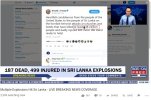Some recent news feeds, with
Benjamin Netanyahu to the rescue.
Seven people who are suspected of being connected to a series of bombings that hit Sir Lanka on Easter Sunday...

southfront.org
Seven people who are suspected of being connected to
a series of bombings that hit Sir Lanka on Easter Sunday were arrested by the country’s authorities, Sri Lanka’s Defense Minister, Ruwan Wijewardene, has announced.
More than 200 people were killed and more than 400 others were injured as a result of 8 bombings, which targeted the St. Anthony’s Church in Colombo, St. Sebastian’s Church in Negombo, the Zion Church in Batticaloa as well as the Shangri-La, Cinnamon Grand and Kingsbury five-star hotels.
Following the attacks, Prime Minister Ranil Wickremesinghe convened Sri Lanka’s top military officials at an emergency meeting of the country’s National Security Council. The nation’s parliament is also set to hold an emergency meeting on Monday.
As a part of several security measures taken after the attack, the government stepped up security measures at international airports and impose a “temporary” social media ban.
“The government has decided to block all social media platforms in order to prevent incorrect and wrong information being spread. This is only a temporary measure” Udaya R. Seneviratne, secretary to the president said in a statement, according to al-Jazeera.
No group has claimed responsibility for the attacks so far. However, the available information indicate that the bombings were carried out by terrorist affiliated with ISIS or even al-Qaeda.
Both terrorist groups vowed to attack Christians worldwide following the Christchurch mosque shootings, on March 15. 50 Muslims were reportedly killed in the shootings.

No Israelis were hurt in the attacks, according to the Foreign ministry.

www.jpost.com
Prime Minister Benjamin Netanyahu expressed “deep shock” at the terrorist attacks in Sri Lanka on Sunday that killed more than 200 people, and said Israel is ready to render assistance to the authorities in Sri Lanka “at this difficult hour.”
“The entire world must unite in the struggle against the plague of terror,” he said in a statement.
Israel's ambassador to India Ron Malka, who serves as the country's non-resident envoy to Sri Lanka as well, also offered assistance earlier in the day. So far, no requests for anything concrete has come from Colombo.
President Reuven Rivlin said in a Twitter post that the attacks, including against worshipers on Easter Sunday,
“are a despicable crime.”
“We are all children of God; an attack on one religion is an attack on us all,” he wrote. “Israel sends condolences to the families of the victims and wishes for the recovery of the injured.”
The Foreign Ministry said on Sunday that no Israelis were involved in the attacks, and that an Israeli who died in the country on Sunday died from injuries suffered in the country in an unrelated accident last week.
Sri Lanka is a vacation destination for Israelis, particularly for surfing enthusiasts, and an estimated 8,000 Israelis visited the country last year, with the number expected to increase by more than 50% this year.
The ministry advised Israeli tourists there to stay away from churches and popular tourist attractions, and to inform their relatives in Israel of their whereabouts. Although the government clamped a curfew on the country, the airport is open and tourists who want to leave the country can do so via transportation supplied by their hotels.
Ties between Israel and Sri Lanka have, over the years, known peaks and valleys, with current period being among the peaks, according to Danny Carmon, who served as Israel's ambassador to India and not-resident ambassador to Sri Lanka from 2014-2018.
The turning point came in 2015 following democratic balloting in the country and the election as president of Maithripala Sirisena, who favors more openness to the West than his predecessor, Mahinda Rajapaksa.
Israel has benefited from this tilt a bit as well, and since then, the country's voting pattern toward Israel in the UN has improved slightly – for example it abstained on a UNESCO vote in October 2016 which erased any Hebrew reference to the Temple Mount, and also abstained, rather than voted against, a resolution in December in the UN General Assembly to condemn Hamas violence in Gaza.
This stands in contrast to the 1960's and 1970s, when Sri Lanka played a central role in the Non-Aligned Movement -- along with India, Cuba and Yugoslavia -- and relations between the two countries were often problematic.
Colombo broke off ties with Israel in 1970 and again in 1990 after a brief resumption of low level relations in the early 1980s. The ties were restored again in 2000.
Even when there were no formal ties, Israeli arms sales to Sri Lanka continued, primarily Kfir planes and patrol boats.
Sri Lanka purchased 16 Kfir jets from Israel between 1995 and 2005, seven of which were lost during the 26-year-long Sri Lankan civil war. A Kfir plane, Carmon said, adorns the square at the entrance to the country’s Air Force Headquarters in Colombo.
According to the the Stockholm International Peace Research Institute, Israel provided $455 million worth of arms to Sri Lanka from 1990 to 2018, second only to China.
While Israel does not have an embassy in Colombo,
Sri Lanka does have one in Tel Aviv. Carmon said that the embassy is active in many spheres, especially in dealing with the Sri Lankan caregivers in Israel.
Remittance payments from Sri Lankan workers abroad is significant for the South Asian country,
Carmon said, adding that Israel is considered one of the better work destinations for Sri Lankan caregivers, both in terms of their treatment here, and the salaries. Currently there are an estimated 8,000 to 9,000 Sri Lankan caregivers in the country. 







 What the article fails to state - it's a NATO exercise.
What the article fails to state - it's a NATO exercise.

